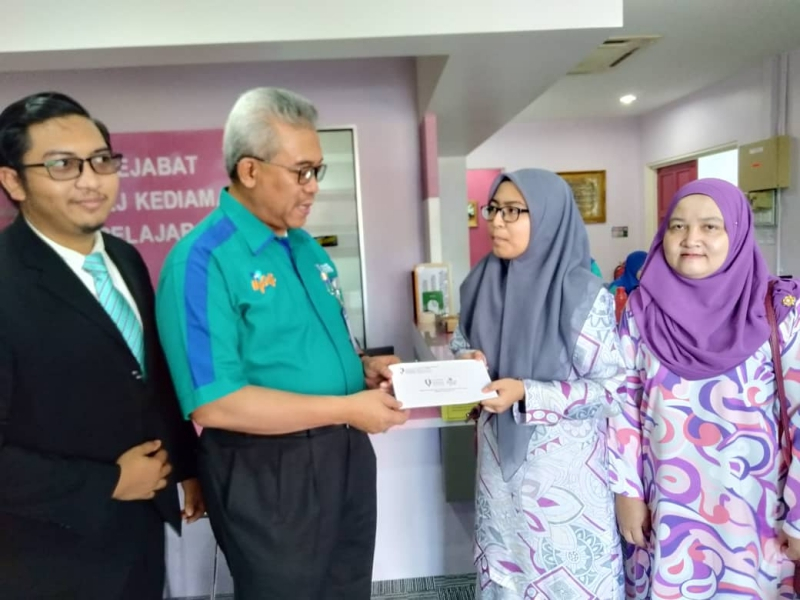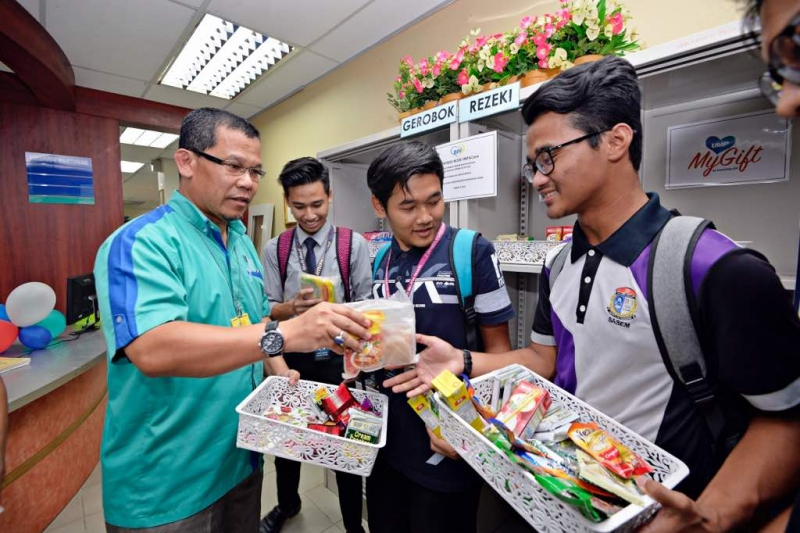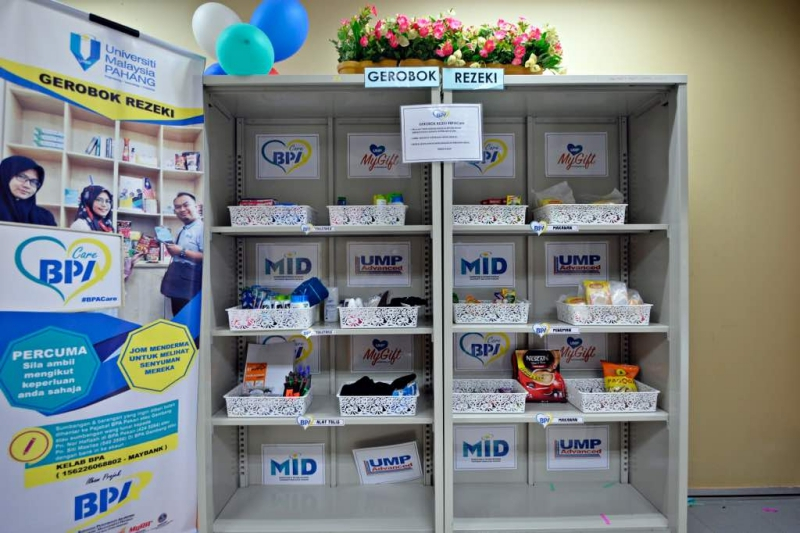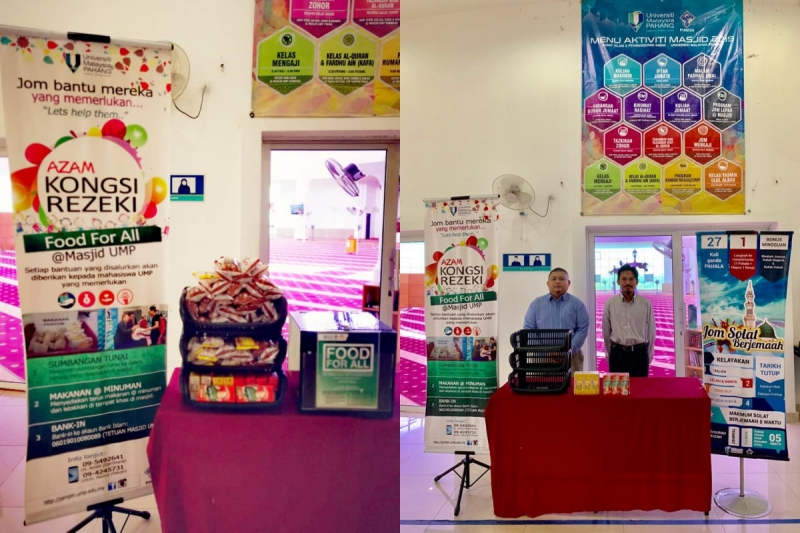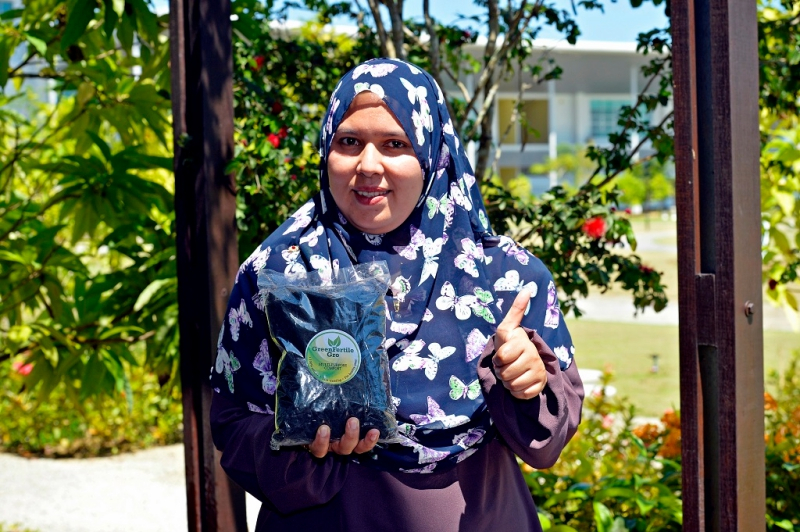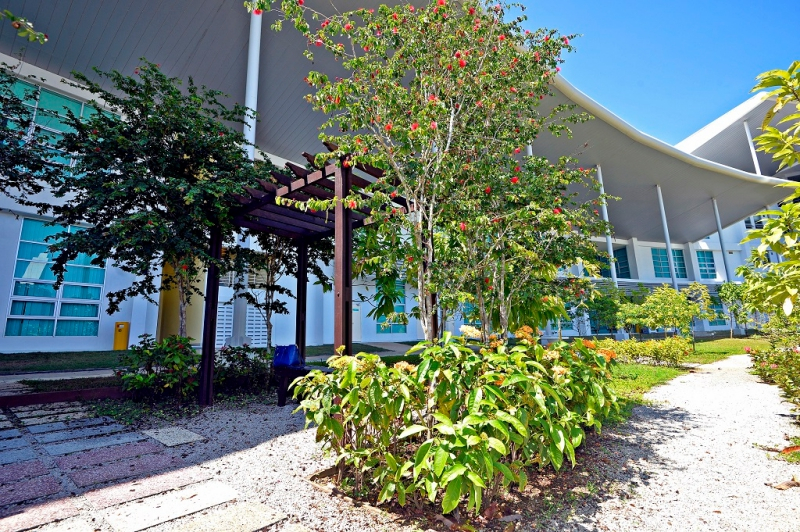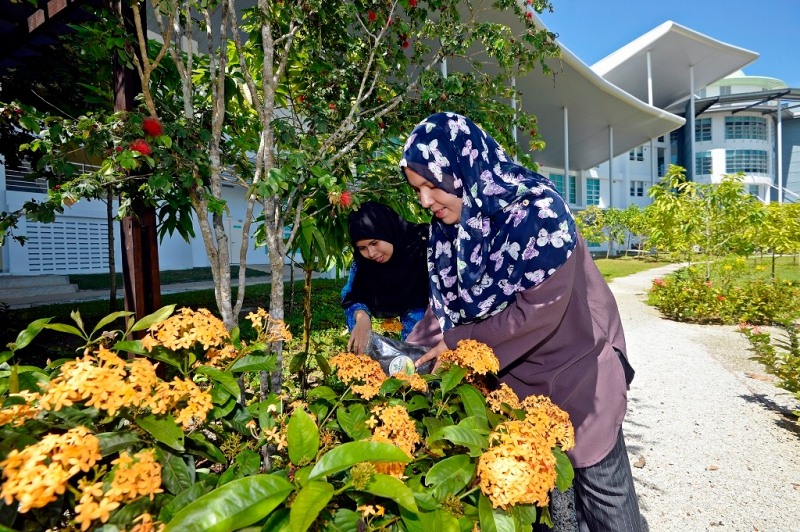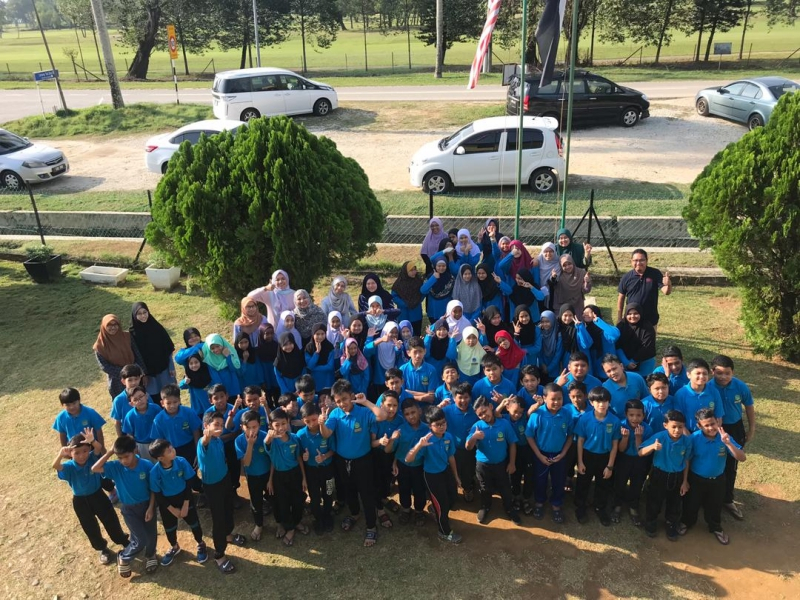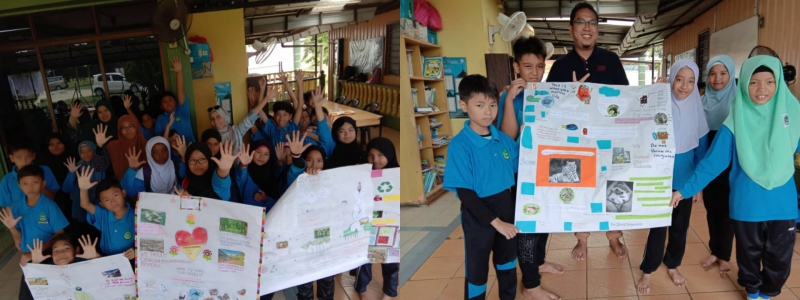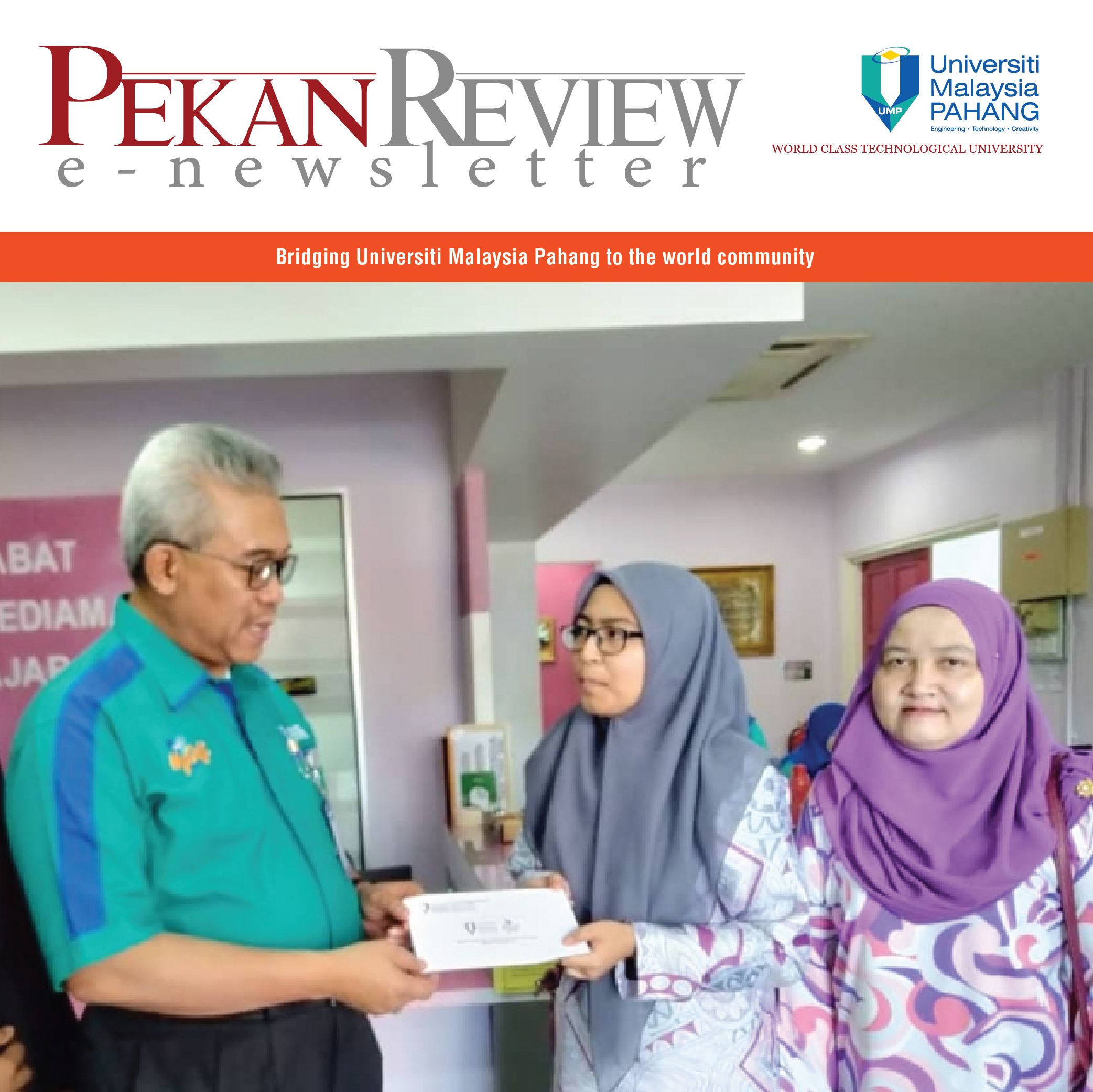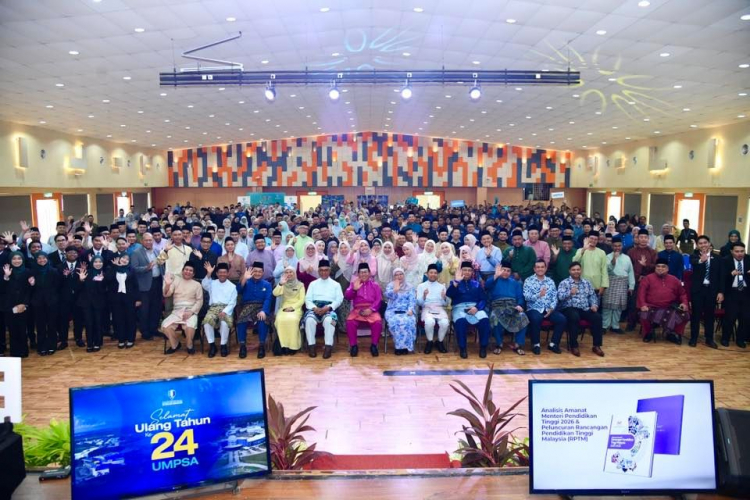 MyGift UMP Cares – Food for All Programme for students and the needy
The Islamic Centre and Human Development (PIMPIN) and MyGift Squad, Universiti Malaysia Pahang (UMP) organised a programme called ‘Food for All’ as part of the efforts to tackle issues involving some of the university students who often had to go hungry due to financial constraint. Under this programme, students are provided with free breakfast and lunch distributed at UMP mosques in Pekan and Gambang. On Thursdays, UMP even provided meals for breaking of fast for those who fast on that day.
The ‘Food for All’ coordinator Siti Nazira Hazudin from PIMPIN said they provided food such as biscuits, breads, crackers, fruits and drinks at the mosque that were mainly donated by the public and non-governmental organisations. She said this when met during the presentation of special education incentive to new students. As a show of support towards the university’s move to help the students, various initiatives were carried out by other departments as well. The Student Affairs and Alumni Department (JHEPA)’s programme is called, ‘Kongsi Rezeki’ (Sharing of Sustenance), and together with the university cafeteria, they helped distribute food packs to students facing financial problems and those who were eligible, at both the campuses in Gambang and Kuala Pahang.
The Residential College Representatives (PEKA) delivered free breakfast meals distributed at certain allotted times. As for the #BPACare ‘Gerobok Rezeki’ (Cupboard of Sustenance) project, Academic Management Division (BPA) in Gambang and Pekan had cupboards filled with basic essential items for the students to take for free. According to Deputy Vice-Chancellor (Student Affairs & Alumni), Professor Dato’ Dr. Yuserrie Zainuddin, the university had a role to play in producing professionals to develop the country and as such, university students needed to focus on their studies in an environment that was conducive. “The reality is that some of the less fortunate students do have problems to continue with their studies because of academic problems or lack of expenses. It is the responsibility of the university to ensure that they complete their studies. “This social responsibility is not an option but something that needs to be done. Aids received are in many forms and are also based on the university’s own capacity.
“The aids are in the forms of tithes, scholarships, special assistance before classes commenced and welfare aids for fee and medical payments,” he said. He said the students were also encouraged to do business as the university had spaces allotted for such a purpose as well as biz box. “For the less fortunate ones, we create the opportunity for them to work and study so they can earn extra income but for them to do so without compromising their academics. Priority is still on their studies so they must know how to divide their times. They must also get advice from the counsellors so their academic performances can be monitored. UMP welcomes contributions from university staff, students, alumni, individuals and corporate bodies, be it locally or abroad, for this noble cause that will further help knowledge to thrive in the university. Facts on the Student Scholarship EndowmentScholarship Sponsorship for Outstanding Students of Poor Background UMP offers scholarships to outstanding students of poor background to help them study in the university and pursue higher education. The sponsorship covers tuition fees, accommodation and expenses. Education Incentive An incentive of RM1,000 is given to potential students with financial constraints and who wish to pursue their studies in UMP. The incentive is to help with the fees or expenses while in the university. Types of Endowments/Funds of UMP MyGift 1. Endowment for Chair Research and Innovation Compost fertiliser from palm oil mill waste for growing organic crops
Palm oil plantation in the country is the largest agriculture crop in the country and as such, mass oil production of that scale will surely result in massive waste of empty fruit bunch. In fact, only 10 percent of the oil is produced while the remaining 90 percent is agriculture waste or biomass. Some of the waste are processed into animal food while some are simply thrown away. This situation made Dr. Nor Hanuni Ramli@Said, a researcher with Universiti Malaysia Pahang (UMP), to come up with an idea on finding means to turn the biomass into organic fertiliser. Dr. Nor Hanuni who is also a lecturer with Faculty of Chemical & Natural Resources Engineering (FKKSA) said, a research was conducted that also involved tackling problems relating to pollutions and how to manage the huge amount of waste discarded by factories around UMP and throughout the state. “The compost is 100 percent organic. It is produced by way of composting method that involves decomposition (oxidation) of the organic waste which is then processed into products that can be used for growing crops. “It involves aerobic composting method, mixing micro-organism, air, humidity and nutrient or suitable material for composting. The compost produced has basic nutrient needed by crops and has high water holding capacity,” she said.
She added that the research received a grant under UMP Lab2Market Grant Programme, with the objective of producing the product for the commercial market. “We marketed the products in two sizes, a pack of one kilogram priced at RM10 and a pack of 10 kilograms priced at RM50. We also brought the products to MAHA Exhibition 2016. “We are mindful that awareness towards organic products especially on food resource among Malaysians is still low as compared to countries such as the UK, US and Singapore. “The prices of organic fruits and vegetables are sold up to three times higher than the inorganic crops in the countries,” she said.
She also said by producing organic products, this would help to increase awareness and educate the public on crops grown using natural materials. She hoped that more could be done so the society could be educated and informed about using organic products in their daily lives and for them to grow their own vegetables that would be healthier and cost-saving, and helped improve their economic standing. Dr. Nor Hanuni also said although there were a lot of compost fertilisers in the market, not all were genuine because some producers added nutrients from inorganic resource. Academic and International Reach-Out Programme with Integrated Islamic School Kuantan: ‘TOEFL® Young Students Series GO English! Project’
By: AMY ZULAIKHA MOHD ALI, CENTRE FOR MODERN LANGUAGES & HUMAN SCIENCES (CMLHS) Seventy nine pupils were involved in the TOEFL® Young Students Series GO English! Project that was held at the Integrated Islamic School (IIS) in Kuantan on January 26, 2019. It was organised by the Educational Testing Service (ETS), the world’s largest non-profit educational measurement organisation and assisted by English language instructors from University Malaysia Pahang (UMP) Centre for Modern Languages & Human Sciences (CMLHS). One of them was senior language teacher Noor Azlinda ZainalAbidin who was appointed as a coordinator in the project. The school was picked by Eshia and Associates Sdn. Bhd. - the country representative for ETS.
Noor Azlinda and her team of six English instructors took part in the project which was also one of the initiatives under the university’s community service programme. The project, which was in its first year, aimed to encourage pupils to speak in English. The pupils were divided into small groups so activities could be done in a more creative and fun manner. Topics of the activities were based on animal, nature and people such as ‘Love the Animals’, ‘Love the Nature’ and ‘Love the Community’. The pupils were guided to come up with ideas that expressed their aspirations on the project’s main subject, ‘How to Make the World a Better Place’ – the theme for this year’s project. With the right coaching from UMP facilitators and IIS teachers, the pupils were motivated to speak and improve their English language skills. Using their imagination, they also created interesting posters and when completed, they were beaming with pride of their artworks. The pupils also received special rewards for taking part in the project including a plaque, promotional items, educational materials and certificate of achievement when they submitted their projects. Eshia and Associates Managing Director, Ezani Amir said, ETS Malaysia lauded the participants who worked hard on the project, demonstrating their creativity, research skills, communication skills and teamwork skills at a very young age. “It reflected the good dynamics of IIS, UMP, the parents and children. “These are the skills needed in the workforce and entrepreneurs of the 21stcentury,” he added.
One of the participants, Faznur Fadilla Md. Ali, 11, was seen encouraging her group members to think on ways to carry out a recycling project. The Standard Five pupil brought a lot of materials from home such as pictures from books and magazines, stickers, and other decorative stationaries which she had prepared earlier with the help of her parents so her team could complete the project. Another participant, Mohamad Farrel Dazeman Mohamad Fatasya, 11, said the discussion on the need to protect and care for nature helped to spur interest among the pupils to learn new words. “Personally, I am excited to be part of this project. Through the discussions and posters that we have made, pupils like me can learn new words and ideas that are related to nature. We learn the need to plant more trees and say no to illegal logging,” he said. IIS Headmaster, Abdul Rahim M. Ali said, the project involved 10 teachers from the school and seven facilitators from UMP to guide and assist pupils through communicative activities in English. “This is an opportunity for pupils to realise the importance of English and effective communication so important messages can be conveyed to the world. This initiative also helps to boost the pupils’ motivation and confidence to speak in English,” he said. IIS Proprietor, Nor Diana Kassim said, it was a good programme for the IIS pupils because it used a different approach to brainstorm ideas. The poster-making activity encouraged the pupils and parents to be involved in the project, she added. “My hope is for the programme to be held annually in this school. Even though it is only a day-long project, it managed to generate interest and created long-lasting impacts. The momentum can be kept through classes run by the teachers,” said Nor Diana. 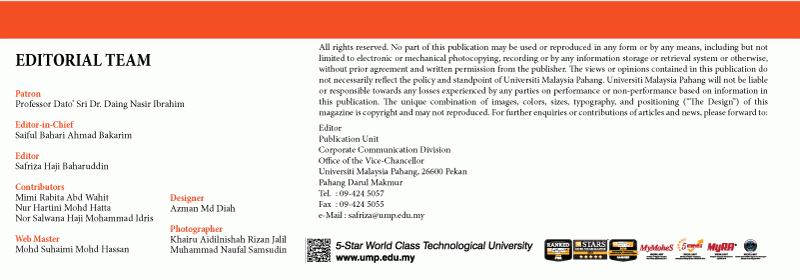 |
- 63 views


